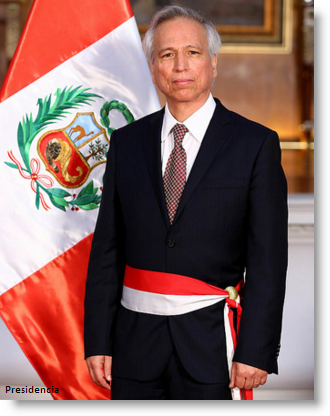 The new minister for Justice and Human Rights, Aldo Vasquez, was sworn in at the government palace on Wednesday evening, during a week of some of the most difficult crises that President Ollanta Humala’s government has faced since taking office in 2011.
The new minister for Justice and Human Rights, Aldo Vasquez, was sworn in at the government palace on Wednesday evening, during a week of some of the most difficult crises that President Ollanta Humala’s government has faced since taking office in 2011.
Vasquez succeeds Gustavo Adrianzen, who resigned this week just as Congress was determined to censure him for firing a state prosecutor, Julia Principe, who was in charge of investigating the now-infamous notebooks stolen from the first lady, Nadine Heredia. Principe believes the notebooks indicate possible money laundering by Heredia, and a team of graphologists from the Legal Medicine Institute have been assigned to study the four notebooks, which were stolen a year ago from Heredia’s home.
Much of the information in the notebooks covers several years before President Humala was elected but they have become the favorite punching bag of the season for the opposition.
Principe, who has been in charge of investigating money laundering cases for the past 12 years, was criticized by the Justice minister for giving an opinion to the press about the Heredia case without first asking permission. On an earlier case, she did request permission before giving details to the public. Jurists disagree on whether a prosecutor has to right to do so or not, but Adrianzén demanded she be removed immediately.
Adrianzen said on Canal N TV that Principe’s dismissal was due to several reasons and especially for her openly confrontational attitude in recent weeks. “Her position was one of trust, and it can be granted as it can be removed.”
Firing Principe has been one of Humala’s greatest mistakes, according to Gustavo Gorriti, head of the investigative journalism unit IDL-Reporteros.
During an interview on Ideeleradio, Gorriti suggested that the investigation into corruption in the Humala administration should not only continue but that it should include the reasons behind Principe’s dismissal.
“Having said that, we need to remember that the problem of corruption in the governments we have had is well distributed among all of them, with the exception of the Paniagua administration,” Gorriti said. “In the case of the Toledo and Garcia governments there are very clear cases of corruption, which must be investigated much more deeply, and I would say that in comparative terms, possibly the greatest incidence of corruption occurred during Garcia’s government.” (Valentín Paniagua, president of Congress, became president in 2000 when President Fujimori fled the country and resigned by fax from Japan. His nine-month administration was exemplary in dismantling much of the corrupt structure of the Fujimori regime, installing the Truth and Reconciliation Commission and leading the country to national elections.)
Justice minister Vasquez, who also has degrees in social sciences and journalism, brings a possibly less politically charged focus to the portfolio than his predecessor, who was took doctoral studies in law at Deusto University in Bilbao, Spain, and obtained his doctoral degree at the Complutense University in Madrid. Most recently he has been the dean of the social sciences faculty at the Jesuit university of Antonio Ruiz de Montoya, and director of the university’s law school, as well as a member of the Justice Minister’s advisory cabinet.
Joel Segura, the leading prosecutor in corruption cases, said he probably would be working with the new minister next week on plans to consolidate the national anti-corruption plan and had full confidence in Vasquez’ work.





